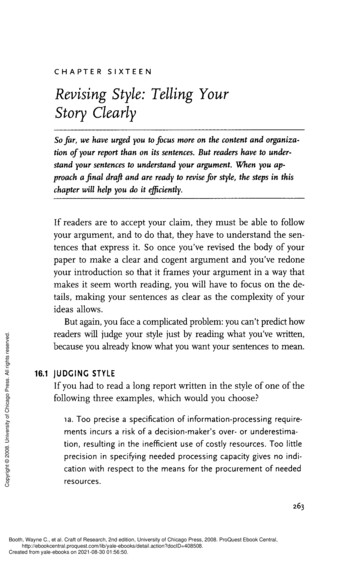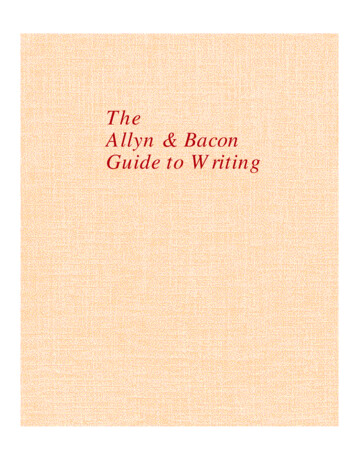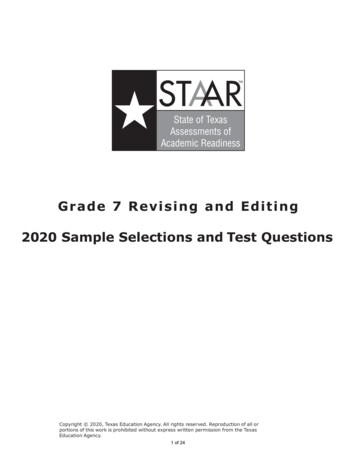
Transcription
CHAPTER SIXTEENRevising Style: Telling YourStory ClearlyCopyright 2008. University of Chicago Press. All rights reserved.Sofar, we have urged you tofocus more on the content and organization of your report than on its sentences. But readers have to understand your sentences to understand your argument. When you approach a Jinal draft and are ready to revise for style, the steps in thischapter will help you do it eficiently.If readers are to accept your claim, they must be able to followyour argument, and to do that, they have to understand the sentences that express it. So once you've revised the body of yourpaper to make a clear and cogent argument and you've redoneyour introduction so that it frames your argument in a way thatmakes it seem worth reading, you will have to focus on the details, making your sentences as clear as the complexity of yourideas allows.But again, you face a complicated problem: you can't predict howreaders will judge your style just by reading what you've written,because you already know what you want your sentences to mean.16.1 JUDGING STYLEIf you had to read a long report written in the style of one of thefollowing three examples, which would you choose?la. Too precise a specification o f information-processing requirements incurs a risk o f a decision-maker's over- or underestimation, resulting in the inefficient use o f costly resources. Too littleprecision in specifying needed processing capacity gives no indication with respect to the means for the procurement o f neededresources.Booth, Wayne C., et al. Craft of Research, 2nd edition, University of Chicago Press, 2008. ProQuest Ebook ebooks/detail.action?docID 408508.Created from yale-ebooks on 2021-08-30 01:56:50.
264P R E P A R I N G TODRAFT,D R A F T I N G ,A N DR E V I S I N Gib. A person who makes decisions may specify what he needs toprocess information. He may do so too precisely. He may overor underestimate the resources that he needs. When he doesthat, he may use costly resources inefficiently. He may also failto be precise enough. He may not indicate how others shouldprocure those resources.ic. When a decision-maker specifies too precisely the resourceshe needs to process information, he may over- or underestimatethem and thereby use costly resources inefficiently. But i f he isnot precise enough, he may not indicate how those resourcesCopyright 2008. University of Chicago Press. All rights reserved.should be procured.Few readers choose ( a )some;choose ( b )most;choose (IC).Ex)like a machine speaking to a machine (it actuample ( asoundsally appeared in a respectable journal). Example ( bis) clearer butalmost simpleminded, like an adult speaking slowly to a child.Example (IC) is clearer than ( a but) , not condescending like ( b ) ;it sounds more like a colleague speaking to a colleague. One ofthe worst problems in academic writing today is that too manyresearchers write like ( a ) .Some would disagree, claiming that heavy thinking demandsheavy writing, that some ideas are so intrinsically complex thatwhen writers try to make them clear, they oversimplify, sacrificing nuances and complexity of thought. For them, if readers can'tunderstand, well, that's their problem.Perhaps. Everyone who reads the philosophers ImmanuelKant or Friedrich Hegel struggles with their style, at least at first.But most serious readers concede that understanding what theyhave to say is worth the effort. The problem is, few of us are aKant or Hegel. For most of us most of the time, such complexwriting is more likely to reflect sloppy thinking than the irreducible difficulty in the ideas of genius. Even when complex thinking warrants a complex style (less often than we think), everysentence profits from a second look; no sentence (including anyof ours) is above revision (in fact, Kant and Hegel could haveprofited from good editors of their own).Booth, Wayne C., et al. Craft of Research, 2nd edition, University of Chicago Press, 2008. ProQuest Ebook ebooks/detail.action?docID 408508.Created from yale-ebooks on 2021-08-30 01:56:50.
Revising Style 265Of course, some writers go too far in avoiding a complex style,using only short, simple sentences like those in ( babove.)Butwe assume that most of you reading this chapter do not havethat problem, and that you need little help with your spelling andgrammar. (If you think you need such help, ask your teacher torecommend a handbook and tell you where your school's writingtutors hang out.) We address here the problem of a style that isunnecessarily complex, too "academic," more difficult than it hasto be.This problem especially afflicts those just starting advancedwork because they are hit by double trouble. First, when theyhave to write about complex ideas that test their comprehension,their style breaks down. Second, they often compound the problem when they take as a model those writers whose prose is terminally dense, because they think that a complex style bespeaksacademic success. They are wrong. Convoluted, indirect, impersonal prose does not represent what truly expert writers can write,but what thoughtless writers are able to get away with.Copyright 2008. University of Chicago Press. All rights reserved.16.2 A F I R S T P R I N C I P L E : S T O R I E S AND G R A M M A RWhen you chose among the three examples above, you probablyevaluated each one using words like clear or unclear, concise orwordy, direct or indirect. But notice that those words really referto how youfelt about the sentences, to your impressions of them.) dense, you were really saying that youIf you said that ( awashad a hard time getting through it; if you said (IC) was clear, youwere saying that you found it easy to understand. There is nothingwrong with impressionistic language, but it does not explain whato n the page makes youfeel as you do. To do that, you need a wayof talking about sentence style that lets you connect your impressions to what causes them.)The principles that distinguish the felt complexity of ( afromthe mature clarity of (IC) are few and simple. Those principleswill direct your attention to only two parts of your sentences: tothe first six or seven words and to the last four or five. If you canget those few words straight, the rest of the sentence will usuallyBooth, Wayne C., et al. Craft of Research, 2nd edition, University of Chicago Press, 2008. ProQuest Ebook ebooks/detail.action?docID 408508.Created from yale-ebooks on 2021-08-30 01:56:50.
take care of itself. To understandthese principles, though, you mustfirst understand five grammaticalterms: subject, verb, noun, preposition,and clause. (If you haven't thoughtabout those terms for a while, refreshyour memory before you go on.)16.2.1 Subjects and CharactersKeep in mind that ouradvice applies to revision.In chapter 12 we urgedyou to draft quickly, to getsomething down on paper bcforc you start concentrating on details o fsentence stnrcture, punctuation, or spelling. Ifyou apply the advice hereabout revising as youdt@, you may tie yourself in knots. Save yourconcern for style untilyou have something torevise.The first principle may remind you ofsomething you learned in grammarschool, but it is in fact more complicated. At the heart of every sentenceare its subject and verb. At the heartof every story are its characters andactions. In grammar school you probably learned that subjectsare characters (called "doers"). But that is not always true,because subjects can refer to things other than characters.Compare these two sentences (the whole subject in each clauseis underlined):2a.Locke frequently repeated himself because he did not trustCopyright 2008. University of Chicago Press. All rights reserved.words to name things accurately.2b. The reason for Locke's frequent repetition lies in his distrusto f the accuracy o f the naming power o f words.The subjects in (za) fit that grammar-school definition: the subjects-locke and he-are doers. But the subject of (2b)-The reasonfor Locke'sfiequent repetition-certainly does not, because reason is not a character.We can see the same difference between these two (whole subjects are underlined):3a. I f rain forests are continuously stripped to serve short-termeconomic interests, the entire biosphere may be damaged.Booth, Wayne C., et al. Craft of Research, 2nd edition, University of Chicago Press, 2008. ProQuest Ebook ebooks/detail.action?docID 408508.Created from yale-ebooks on 2021-08-30 01:56:50.
Revising Style 2673b. The continuous stripping o f rain forests in the service o fshort-term economic interests could result in damage to theentire biosphere.In the clearer version, (ja), look at the first few words of eachclause:3a. I f rain forestssUbjectare continuously strippedve,b. . . theentire biospheresubjectmay be damaged.,erbThose subjects name the main characters in a few short, concretewords: rainforests and the entire biosphere. Compare this:3b. The continuous stripping o f rain forests in the service o fshort-term economic interestssUbjectcould resultverb in damage toCopyright 2008. University of Chicago Press. All rights reserved.the entire biosphere.In (jb) the subject does not express a concrete character in a fewconcise words but rather an action in a long complex phrase: Thecontinuous stripping of rain forests in the sewice of short-term economic interests.If we can agree that (za) and (3a) are clearer than (2b) and(jb), then we can see why grammar-school definitions may bebad language theory but good advice about writing. The first principle of clear writing is this:Readers will judge your sentences to be clear and readable tothe degree that you can make the subjects o f your verbs namethe main characters in your story. In particular, make your subjects short, specific, and concrete.16.2.2 Verbs, Actions, and "Nominalizations"There is a second key difference between clear and unclear prose:it depends on how writers express the crucial actions in their stories-as verbs or as nouns. For example, look again at the pairsof sentences (2) and (3) below. (Words naming actions are bold-Booth, Wayne C., et al. Craft of Research, 2nd edition, University of Chicago Press, 2008. ProQuest Ebook ebooks/detail.action?docID 408508.Created from yale-ebooks on 2021-08-30 01:56:50.
faced; actions that are verbs are underlined; actions that arenouns are double-underlined.)2a. Locke frequently repeated himself because he did notwords to name things accurately.trust2b. The reason for Locke's frequent repetition lies in his distrustof the accuracy of the naming power of words.ja. If rain forests are continuously stripped toshort-termeconomic interests, the entire biosphere may be damaged.3b. The continuous stripping of rain forests in the service ofshort-term economic interests could result in damage to theentire biosphere.Copyright 2008. University of Chicago Press. All rights reserved.Sentences (za) and (ja) are clearer than (2b) and (3b) becausetheir subjects are characters, but also because their actions areexpressed not as nouns but as verbs: repeated vs. repetition, theverb trust vs. the noun distrust; the verb name vs. naming power,stripped vs. stripping, serve vs. service, the verb damaged vs. thenoun damage.Moreover, when you express actions not with abstract nounsbut with verbs, you get rid of the clutter of prepositions. Look atthe prepositions (boldfaced) in (4a) that (4b) doesn't need:4a. Our development and standardization of a n index for themeasurement of thought disorders has made possible quantification of response as a function of treatment differences.qb. Now that we have developed and standardized a n index tomeasure thought disorders, we can quantify how patients respond to different treatments.You're forced into using lots of prepositions-in this case, fouro&, one as, and one for-when you turn verbs into nouns: develop development, standardize standardization, measure - rneasurement, quantih quantijcation, respond response.There is a technical term for turning a verb (or an adjective)into a noun: we nominalize it. (When we nominalize the verbnominalize, we create the nominalization nominalization.) MostBooth, Wayne C., et al. Craft of Research, 2nd edition, University of Chicago Press, 2008. ProQuest Ebook ebooks/detail.action?docID 408508.Created from yale-ebooks on 2021-08-30 01:56:50.
Revising Style 269nominalizations end with endings such as -tion, -ness, -ment,-ence, -ity. But some are spelled like the requencyintelligencespecificityWhen you nominalize adjectives and verbs, you change your sentences in two other ways:You have to add verbs, which will always be less specificthan the ones you could have used.You are likely to make the characters in your story modifiersof nouns or to drop them from a sentence altogether.So here are two basic principles of a clear style:Make your central characters the subjects of your verbs;keep those subjects short, concrete, and specific.Copyright 2008. University of Chicago Press. All rights reserved.Use verbs to express crucial actions.16.2.3 Diagnosis and RevisionFrom these principles of reading, we can offer some ways to diagnose and revise your sentences.To diagnose:I.Draw a line under the first six or seven words of everyclause, whether main or subordinate, at the beginning,middle, or end of a sentence.2.If those first six or seven words are subjects that are notcharacters but abstractions, and if the verb is a general onelike have, do, make, be, and so on, that sentence is one youshould probably revise.Booth, Wayne C., et al. Craft of Research, 2nd edition, University of Chicago Press, 2008. ProQuest Ebook ebooks/detail.action?docID 408508.Created from yale-ebooks on 2021-08-30 01:56:50.
To revise:I.First, locate the characters you want to tell a story about. Ifyou can't find any, decide who ought to be the main characters.2.Next, look for what those characters are doing. If their action is in a nominalization, change it into a verb (i.e., "denominalize" it) and make the character its subject.Remember that you may have to recast your sentence aroundsome version of I f X , then Y; Because X . . . , Y;Although X,Y;When X, then Y.That's the simple version. Now we must make it a bit morecomplex.Copyright 2008. University of Chicago Press. All rights reserved.16.2.4 Who or What Can Be a Character?You may have been surprised when we called rainforests and theentire biosphere "characters,"because one usually thinks of characters as flesh-and-blood.And, in fact, most readers prefer prosein which characters are flesh-and-bloodpeople.But we can also tell stories whose characters are abstractions.In your kind of research, you may have to tell a story about demographic changes, social mobility, unemployment, isotherms, magnetism, or gene pools. Sometimes you have a choice: your paper ineconomics might tell a story about people, such as consumer, theFederal Resewe Board, and Congress, or about abstractions associated with them, such as savings, monetary policy, and legislation.5a. When consumers save more, the Federal Reserve adopts amonetary policy that influences how banks lend money.5b. Increased consumer savings result in a Federal Reserve monetary policy that influences bank lending practices.In this sense, a character is any entity, real or abstract, that youfocus on through several sentences, often making it the subject ofthose sentences. A passage might be about people or about theabstractions associated with them: bankers vs. lending practices,Booth, Wayne C., et al. Craft of Research, 2nd edition, University of Chicago Press, 2008. ProQuest Ebook ebooks/detail.action?docID 408508.Created from yale-ebooks on 2021-08-30 01:56:50.
Revising Style271savers vs. microeconomics, or analysts vs. predictions. In the abstractstories that experts like to tell, main characters are often abstractnominalizations (boldfaced below):6. Now that we have developed and standardized an index tomeasure thought disorders, we can quantify how patients respond to different treatments. These measurements indicate thattreatments requiring long-term hospitalization do not effectivelyreduce the number o f psychotic episodes among schizophrenicpatients.The nominalizations in that second sentence-measurements,treatments, hospitalization-refer to three concepts as familiar toits intended readers as doctors and patients. Given that audience,the writer would not need to revise them.In a way, that example undercuts our advice about avoidingnominalizations, because now instead of revising every nominalization, you have to choose which to change into verbs and whichto leave alone. For example, the nominalizations in the secondsentence of (6) are the same as those in (7a):7a. The hospitalization o f patients without appropriate treatmentCopyright 2008. University of Chicago Press. All rights reserved.results in the unreliable measurement o f outcomes.But that sentence would profit if those nominalizations were revised into verbs:7b. When we hospitalize patients but do not treat them appropriately, we cannot measure outcomes reliably.So what we offer here is no iron rule of writing, but rather aprinciple of diagnosis and revision that you must apply judiciously. In general, however, readers prefer prose whose sentences have subjects that are short, specific, and concrete. Andthat usually means flesh-and-bloodcharacters.16.2.5 Abstractions and CharactersThe worst problems of abstract prose arise when you create amain character out of a nominalization, use that nominalizedBooth, Wayne C., et al. Craft of Research, 2nd edition, University of Chicago Press, 2008. ProQuest Ebook ebooks/detail.action?docID 408508.Created from yale-ebooks on 2021-08-30 01:56:50.
character as the subject o f your sentences, but then sprinkle stillmore nominalizations around it. Here is a passage about twoimmediate intention and prospective intention.Those characters are puzzling enough, but note all the otherabstract characters,nominalizations in the same passage, complicating that storyeven more (we underline the subjects and boldface the nominalizations other than "intention"):8a. The argument is this: The cognitive component of intentionexhibits a high degree of complexity. lntention is temporally divisible into two: prospective intention and immediate intention.The cognitive function of prospective intention is the representa-tion of a subject's similar past actions, his current situation, andhis course of future actions. That is, the cognitive component ofprospective intention is a plan. The cognitive function of immediate intention is the monitoring and guidance of ongoing bodilymovement. Taken together, these cognitive mechanisms arehighly complex. The folk psychological notion of belief, however,is an attitude that permits limited complexity of content. Thusthe cognitive component of intention is something other thanfolk psychological belief.intention, butif we change unnecessary nominalizations back into verbs andCopyright 2008. University of Chicago Press. All rights reserved.We can revise this to keep the abstract characteradjectives (they are boldfaced), we create a m u c h clearer passage:8b. My argument is this: The co nitivecomponent of intentionis quite complex. lntention is temporally divisible into two kinds:prospective intention and immediate intention. The cognitivefunction of prospective intention is to represent how a personhas acted similarly in the past, his current situation, and howwill act in the future. That is, the cognitive component of prospective intention lets him plan ahead. The cognitive function ofimmediate intention, on the other hand, lets him monitor andguide his body asmoves it. Taken together, these cognitivemechanisms are too complex to explain in terms of what folkpsychology would have us believe.Booth, Wayne C., et al. Craft of Research, 2nd edition, University of Chicago Press, 2008. ProQuest Ebook ebooks/detail.action?docID 408508.Created from yale-ebooks on 2021-08-30 01:56:50.
Revising Style 273The point: Don't try to change every nominalization into averb. Some of your central characters may have to be abstractions.But if they are, avoid nominalizations that you do not need. Asalways, the trick is knowing which ones you need and which youdon't (you usually need fewer than you think). Knowing whichones to keep is a skill that comes only from practice and criticism.Main CharactersHaving qualified our principle once, we must now complicate itagain. If your sentences are readable, your characters will be thesubjects of verbs and those verbs will express the crucial actionsthose characters are involved in. But most stories have severalcharacters, any one of whom we can make more important thanothers simply by the way we construct sentences. Take our sentence about rain forests:16.2.6 Picking9. I f rain forests are continuously stripped to serve short-termeconomic interests, the entire biosphere may be damaged.Copyright 2008. University of Chicago Press. All rights reserved.That sentence tells a story that implies other characters but doesnot specify them: Who is stripping the forests? More important, does it matter? This story could focus on them, but who arethey?ga. I f developers continue to strip rain forests to serve shortterm economic interests, they may damage the entire biosphere.gb. I f loggers continue t o strip rain forests to serve short-termeconomic interests, they may damage the entire biosphere.gc. I f Brazil continues to strip rain forests to serve short-termeconomic interests, it may damage the entire biosphere.Which is best? It depends on whom the story should be about.As you diagnose sentences, you have two decisions. Wheneverpossible, put characters in subjects and actions in verbs. But besure that the character is your central character, if only for thatsentence.Booth, Wayne C., et al. Craft of Research, 2nd edition, University of Chicago Press, 2008. ProQuest Ebook ebooks/detail.action?docID 408508.Created from yale-ebooks on 2021-08-30 01:56:50.
274P R E P A R I N G T ODRAFT,D R A F T I N G ,A N DR E V I S I N G16.3 A SECOND PRINCIPLE: OLD BEFORE NEWThere is a second principle of reading, diagnosis, and revisioneven more important than the one we have just explored. F o m nately, the principles are related. Compare the (a) and (b)versionsin the following. Which seems easier to get through? Why? (Hint:Look at the way the sentences begin.)ioa. Because the naming power o f words was distrusted byLocke, he repeated himself often. Seventeenth-century theorieso f language, especially Wilkins's scheme for a universal languageinvolving the creation o f countless symbols for countless meanings, had centered on this naming power. A new era in the studyo f language that focused on the ambiguous relationship betweensense and reference begins with Locke's distrust.lob. Locke often repeated himself because he distrusted thenaming power o f words. This naming power had been central toseventeenth-century theories o f language, especially Wilkins'sscheme for a universal language involving the creation o f countless symbols for countless meanings. Locke's distrust begins anew era in the study o f language, one that focused on the ambig-Copyright 2008. University of Chicago Press. All rights reserved.uous relationship between sense and reference.Most readers prefer ( o b )They.don't say that ( o ais) too complexor inflated, but that it seems disjointed, it does not flow-judgmental words that again describe not what is on the page buthow readers feel about what they are reading.We can explain what causes those impressions if we againapply the "first six or seven words" test. In the disjointed (a) version, the sentences begin differently from the sentences in the)with information that(b) version. The sentences in ( o abegina reader would find unfamiliar:the naming power o f words;seventeenth-century theories o f language;a new era in the study o f language.Booth, Wayne C., et al. Craft of Research, 2nd edition, University of Chicago Press, 2008. ProQuest Ebook ebooks/detail.action?docID 408508.Created from yale-ebooks on 2021-08-30 01:56:50.
Revising Style 275In contrast, the sentences in ( o bbegin)with information thatreaders would find familiar:Locke:this naming power;Locke's distrust [a nominalization, but a useful one because it repeats something from the previous sentence].Some of these are abstractions, but they refer to ideas that appeared in a previous sentence and that readers would recall.As your readers move from one sentence to the next, they follow your story most easily if they can begin each sentence witha character or idea that is familiar to them, either because youhave already mentioned it or because they expect it. From thisprinciple of reading, we can infer our principles of diagnosis andrevision:Look at the first six or seven words of every sentence.Copyright 2008. University of Chicago Press. All rights reserved.Be certain that each opens with information that your readers will find familiar, easy to understand (usually wordsused before).Put close to the ends of your sentences any informationthat your readers will find new, complex, harder to understand.This principle cooperates with the one about characters and subjects, because older information usually names a character (afteryou have introduced it). But should it ever come to a choice between the two, always choose the principle of old before new.16.4 CHOOSING BETWEEN ACTIVE A N D PASSIVEAt this point, some of you may recall advice you received fromEnglish teachers to avoid passive verbs. That advice is not justmisleading; it can be destructive. Rather than worry about activeand passive, ask a simpler question: Do your sentences beginBooth, Wayne C., et al. Craft of Research, 2nd edition, University of Chicago Press, 2008. ProQuest Ebook ebooks/detail.action?docID 408508.Created from yale-ebooks on 2021-08-30 01:56:50.
with familiar information, preferably a main character? If youput familiar characters in your subjects, you will use the activeand passive properly. For example, you may have noticed thatone of our earlier examples had passive verbs:i i a . I f rain forests continue to be stripped to serve short-termeconomic interests, the entire biosphere may be damaged.Had we followed the standard routine advice, that sentence wouldhave to read:i b If. loggers continue to strip rain forests to serve short-termeconomic interests,they may damage the entirebiosphere.Copyright 2008. University of Chicago Press. All rights reserved.That sentence makes the loggers the main character-fine if thereport is about logging and loggers. But if you are telling a storyabout the gene pool in the Amazon, then the main charactersought to be rain forests and the biosphere-and so that sentenceshould be passive.In English classes, students hear that they should use onlyactive verbs, but in engineering, the natural sciences, and somesocial sciences, they hear the opposite-use the passive. Most ofthat advice (based on the alleged interest of scientific objectivity)is equally misleading.Compare the passive (12a) with the active (129:12a. The fluctuations in the current were measured at twosecond intervals.12b.measured the fluctuations in the current a t two-second intervals.These sentences are equally objective, but their stories differ; oneis about fluctuations, the other about the person measuring. Thefirst is supposed to be more "scientific" because it ignores theperson and focuses on the current. But the passive in itself is notmore objective than the active; it merely implies that the actioncan be performed by anonymous others who can replicate theprocedures. So in this case, the passive is the right choice.Booth, Wayne C., et al. Craft of Research, 2nd edition, University of Chicago Press, 2008. ProQuest Ebook ebooks/detail.action?docID 408508.Created from yale-ebooks on 2021-08-30 01:56:50.
Revising Style 277On the other hand, consider this pair of sentences:i3a.It is suggested that the fluctuations resulted from theBurnes effect.i3bWe suggest that the fluctuationsresulted from the Burneseffect.The active verb in (I ) is not only common in the sciences, butappropriate. The difference? It has to do with the kind of actionthe verb names. The passive is appropriate when authors referto actions they perform in the laboratory and that others can replicate: measure, record, combine, and so on. But when authors referto actions that only they are entitled to perform-rhetorical actions such as suggest, prove, claim, argue, show, and so on-thenthe authors are the main characters and so they should be thesubjects of active verbs. Researchers typically use the first personand active verbs at the beginning of journal articles, where theydescribe how they discovered their problem and at the end wherethey describe how they solved it.Copyright 2008. University of Chicago Press. All rights reserved.16.5 A FINAL PRINCIPLE: COMPLEXITY LASTWe have concentrated on how clauses and sentences begin. Nowwe'll look at how they end.
Aug 30, 2021 · 264 PREPARING TO DRAFT, DRAFTING, AND REVISING ib. A person who makes decisions may specify what he needs to process information. He may do so too precisely. He may over- or underestimate the resources that he needs. When










